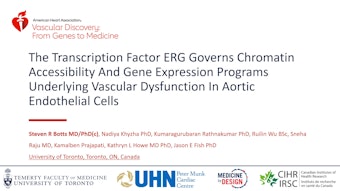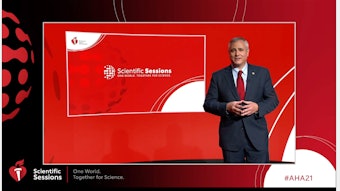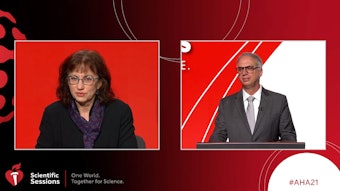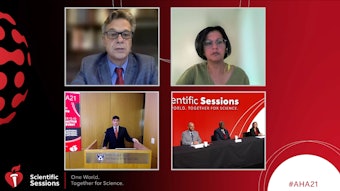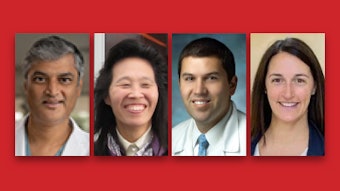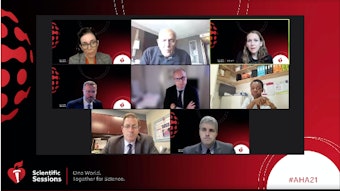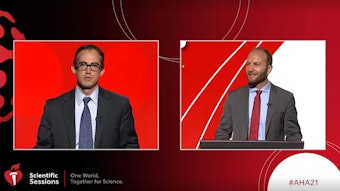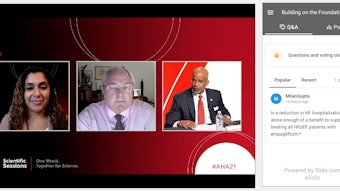Opening Session examines pandemic response
Panelists dissect the confluence of COVID-19 science and social determinants.
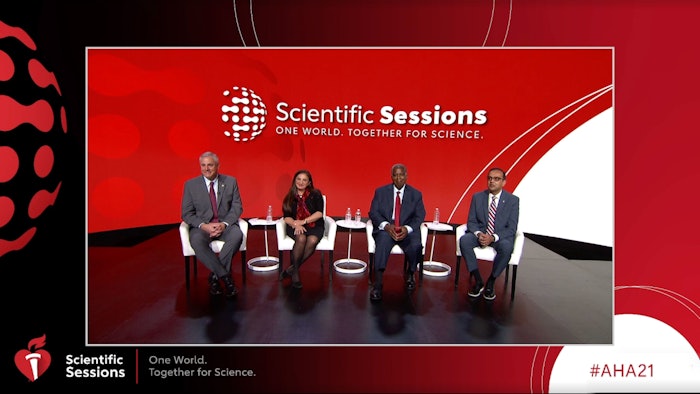
There’s no moving forward without acknowledging the past, particularly when addressing the COVID-19 pandemic that has gripped the world and the health care ecosystem for two years. That was the focus of Saturday’s Scientific Sessions Opening Session, “Scientific Discovery as the Guiding Light: Moving Toward a Post-COVID World.”
Session moderators, AHA President Donald M. Lloyd-Jones, MD, ScM, FAHA, chair of the Department of Preventive Medicine and a professor at Northwestern University Feinberg School of Medicine in Chicago, and Manesh R. Patel, MD, FAHA, chief of the Division of Cardiology and the Division of Clinical Pharmacology at Duke University in Durham, North Carolina, engaged panelists in a thought-provoking and introspective look at pandemic lessons learned. The discussion exposed both the fragilities and strengths of the current health care system as well as AHA’s role in the global response. It’s that “energy” that will set the tone for this year’s three-day Scientific Sessions, Dr. Lloyd-Jones said.
“This event is crackling with energy, but it’s the people who bring it to life,” Dr. Lloyd-Jones told attendees as he reminded them of AHA’s 2024 goal of being “champions for health equity” to advance cardiovascular health for all, including identifying and removing barriers to health care access and quality.
Within months of the start of the pandemic, Dr. Lloyd-Jones said, AHA rapidly deployed millions of dollars in grants and collected real-time data to show that “it’s not about the color of your skin that affects outcomes of COVID hospitalizations.” The problem occurs “further upstream” in terms of social determinants and educating patients before hospitalization.
Calling the pandemic, “a once in a century health crisis,” Gary H. Gibbons, MD, director of the National Heart, Lung, and Blood Institute (NHLBI), said cardiologists were “immediately drawn into the fray of a condition that affects the entire organ system.”
“Our entire community [of investigators] was called upon to be part of the vanguard to address it,” Dr. Gibbons said.
Dr. Gibbons noted the benefit of being able to leverage the NHLBI clinical networks across the country to create a comprehensive platform for rapidly testing therapeutics to identify effective treatment for the COVID-19 public health crisis.
As such, Dr. Gibbons spoke of the importance of addressing and empowering front-line partnerships against COVID-19 disparities via the National Institute of Health (NIH) Community Engagement Alliance. The alliance leverages academic partners, community-based organizations, health care centers and providers, faith-based organizations, state and local government agencies and pharmacy networks.
“For example, in Mississippi, a local pastor might be more effective than a pronouncement from the Centers for Disease Control and Prevention (CDC),” Dr. Gibbons said. “We need to leverage trusted messengers.”
Panelist Victor Dzau, MD, FAHA, a professor of medicine at Duke University, said the provider’s role in understanding social determinants should be part of early medical school training in the pre-clinical years.
Addressing the “drivers of health disparities, including the social determinants of health, structural racism and rural health inequities is the only way to truly achieve equitable health and well-being for all,” as AHA’s 2024 goal states. It’s all a part of a bigger picture, according to panelist Keith C. Ferdinand, MD, FAHA, a professor of medicine at Tulane University School of Medicine in New Orleans. Although Dr. Ferdinand touted the contributions of academics and research, he said health care delivery has failed.
“Implementation science has fallen by the wayside,” Dr. Ferdinand said. However, he noted that advances in telehealth driven by the pandemic will improve future health care delivery in certain areas of the country. In particular, Dr. Ferdinand noted the deployment of wireless technology in rural Mississippi to get patients back on track in managing chronic conditions, such as diabetes and hypertension.
Panelist Emelia J. Benjamin, MD, ScM, FAHA, associate provost for faculty development at Boston University, spoke from her perspective of being at an urban, safety-net hospital. She said the COVID pandemic had exposed profound health care inequities.
“Patients don’t want science from an ivory tower,” Dr. Benjamin said. “They want it from their local communities — in their homes, where they shop.”
Patients can gain trust from the medical and scientific communities from having a diverse group of providers, panelists said. That includes seeing more women in cardiology, according to Roxana Mehran, MD, FAHA, professor of medicine and director of Interventional Cardiovascular Research and Clinical Trials at the Zena and Michael A. Wiener Cardiovascular Institute at Mount Sinai School of Medicine in New York.
Drawing more women to cardiology, making it a family-friendly subspecialty, and advancing more women to leadership roles is critical and will impact patients in a profound way, she said.
“Our workforce must look like the patient, and right now it doesn’t,” Dr. Mehran said. “We’re losing a pipeline of talent, especially women, who have not reached leadership positions.”
Finally, not to be forgotten is the mental health toll the COVID-19 pandemic has taken on clinicians and patient alike, according to Donna K. Arnett, PhD, MSPH, FAHA, dean of the University of Kentucky College of Public Health in Lexington. Arnett underscored the importance of learning this lesson from the current pandemic to prepare for the next.
“We need to think about the future pandemic in terms of mental health among our practitioners, the isolation of children, the elderly, and double the number of emergency room admissions for attempted suicides in teenagers,” Arnett said. “We need to think about that now.”
Visit Scientific Sessions Conference Coverage for more articles.


